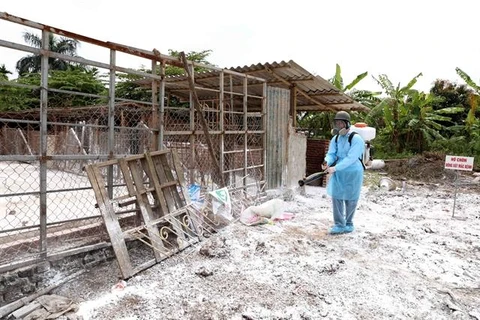Hanoi (VNA) – Blood samples from pigs in several farms in the Philippine capital city of Manila have tested positive for African swine fever, according to the country’s Department of Agriculture.
The announcement was made by the department on September 20, less than two weeks after it declared the first outbreak of the disease in the Philippines.
The Philippine Bureau of Animal Industry has found the African swine fever virus in blood samples from two areas in Quezon city, a part of Metro Manila, said the agriculture department’s spokesman, Noel Reyes.
There are also other areas being monitored by the agriculture department, Reyes added.
Mayor of Quezon city Joy Belmonte said the virus was possibly transmitted from dead pigs found floating in creeks and a nearby river.
The Philippines, the world’s 10th-largest pork consumer and seventh-biggest pork importer, declared its first outbreak of the virus on September 9, after detecting swine deaths and culling more than 7,000 pigs in towns in Rizal province, east of Manila.
It is the latest country in Asia to be affected by the African swine fever. The disease has taken its toll across Asian countries, including China, Cambodia, the Democratic People’s Republic of Korea (DPRK), Laos, Mongolia, and Vietnam.
In early August, the Philippines banned pork and pork-based products from more than a dozen of countries worldwide which were hit by the virus.
The virus is not harmful to humans but causes haemorrhagic fever in pigs that almost always ends in death. There is no antidote or vaccine, and the only method to prevent the disease from spreading is a mass cull of affected livestock./.
The announcement was made by the department on September 20, less than two weeks after it declared the first outbreak of the disease in the Philippines.
The Philippine Bureau of Animal Industry has found the African swine fever virus in blood samples from two areas in Quezon city, a part of Metro Manila, said the agriculture department’s spokesman, Noel Reyes.
There are also other areas being monitored by the agriculture department, Reyes added.
Mayor of Quezon city Joy Belmonte said the virus was possibly transmitted from dead pigs found floating in creeks and a nearby river.
The Philippines, the world’s 10th-largest pork consumer and seventh-biggest pork importer, declared its first outbreak of the virus on September 9, after detecting swine deaths and culling more than 7,000 pigs in towns in Rizal province, east of Manila.
It is the latest country in Asia to be affected by the African swine fever. The disease has taken its toll across Asian countries, including China, Cambodia, the Democratic People’s Republic of Korea (DPRK), Laos, Mongolia, and Vietnam.
In early August, the Philippines banned pork and pork-based products from more than a dozen of countries worldwide which were hit by the virus.
The virus is not harmful to humans but causes haemorrhagic fever in pigs that almost always ends in death. There is no antidote or vaccine, and the only method to prevent the disease from spreading is a mass cull of affected livestock./.
VNA























